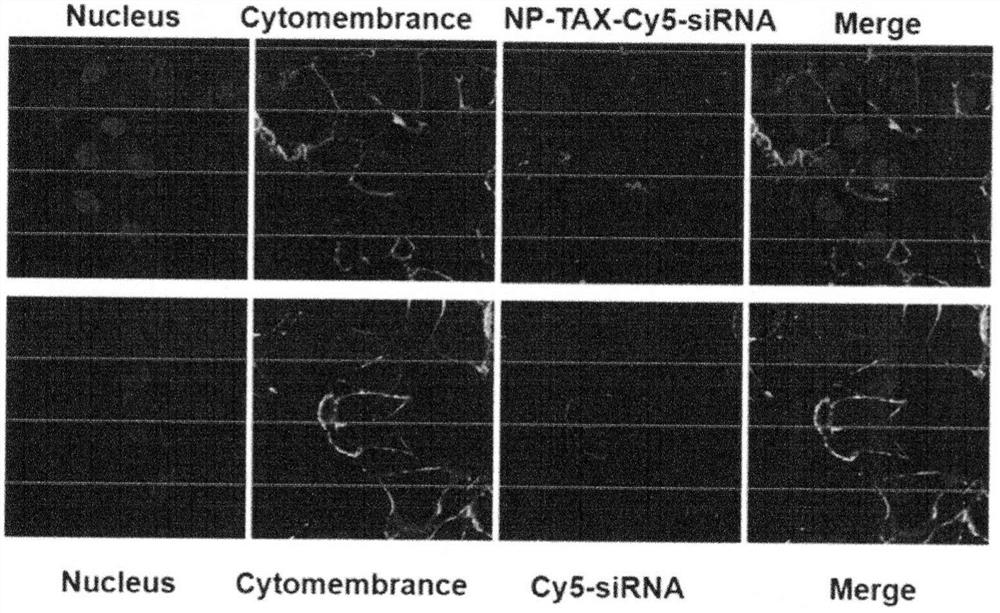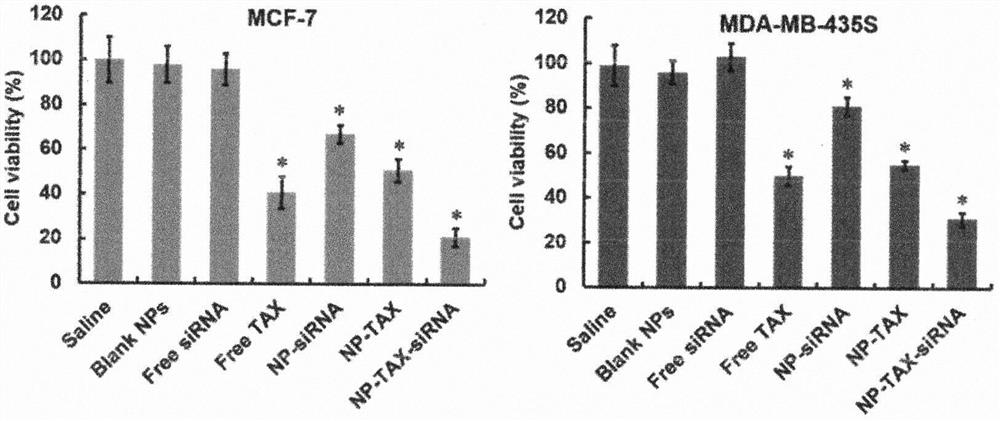Preparation method of tumor-targeting nanoparticle carrier co-loaded with breast cancer chemotherapy drug mtdh siRNA
A chemotherapeutic drug and nanoparticle technology, which can be applied to medical preparations with non-active ingredients, medical preparations containing active ingredients, and drug combinations, etc., can solve the problems of inability to penetrate cell membranes, short half-life of siRNA, and prolong the circulation time. , Improve the curative effect, reduce the effect of toxic and side effects
- Summary
- Abstract
- Description
- Claims
- Application Information
AI Technical Summary
Problems solved by technology
Method used
Image
Examples
Embodiment 1
[0026] a. After dissolving 18mg polyethyleneimine-lactic acid glycolic acid polymer in 1ml dichloromethane, add 0.2ml deionized water and mix well;
[0027] b. Ultrasonic crush the above solution and emulsify it into a homogeneous emulsion; use the cell disruptor at 25% power for 5 minutes;
[0028] c. After mixing 1.8ml of vinyl alcohol with a mass concentration of 1.8% and 0.2ml of hydrophobic paclitaxel with a mass concentration of 1.8% and 2-4ml of dichloromethane, add it to the above-mentioned emulsion, and then continuously add 10ml of it with a mass concentration of 0.6%. In the state of vinyl alcohol, it was ultrasonically crushed again and then emulsified into a homogeneous emulsion;
[0029] d. After the organic phase in the emulsion prepared in step c is removed with a low-pressure rotary evaporator, the nanoparticle cores loaded with paclitaxel are obtained;
[0030] e. Rinse the paclitaxel-loaded nanoparticle core with deionized water for 5 minutes at 12,000 rpm,...
Embodiment 2
[0037] Embodiment 2: the difference between this embodiment and embodiment 1 is that
[0038] a. After dissolving 20mg polyethyleneimine-lactic acid glycolic acid polymer in 1ml dichloromethane, add 0.25ml deionized water and mix well;
[0039] b. Ultrasonic crush the above solution and emulsify it into a homogeneous emulsion; use the cell disruptor at 25% power for 5 minutes;
[0040] c. After mixing 2.0ml of vinyl alcohol with a mass concentration of 2.0% and 0.25ml of hydrophobic paclitaxel with a mass concentration of 2.0% and 2-4ml of dichloromethane, add it to the above emulsion, and then continuously add 10ml of it with a mass concentration of 0.6%. In the state of vinyl alcohol, it was ultrasonically crushed again and then emulsified into a homogeneous emulsion;
[0041] d. After the organic phase in the emulsion prepared in step c is removed with a low-pressure rotary evaporator, the nanoparticle cores loaded with paclitaxel are obtained;
[0042] e. Rinse the pacli...
Embodiment 3
[0043] Embodiment 3: the difference between this embodiment and embodiment 1 is,
[0044] a. After dissolving 22mg polyethyleneimine-lactic acid glycolic acid polymer in 1ml dichloromethane, add 0.3ml deionized water and mix well;
[0045] b. Ultrasonic crush the above solution and emulsify it into a homogeneous emulsion; use the cell disruptor at 25% power for 5 minutes;
[0046] c. After mixing 1.8-2.2ml of vinyl alcohol with a mass concentration of 2.2% and 0.3ml of hydrophobic paclitaxel with a mass concentration of 2.2% and 2-4ml of dichloromethane, add it to the above-mentioned emulsion, and then continuously add 10ml of it with a mass concentration of In the state of 0.6% vinyl alcohol, it was ultrasonically crushed again and then emulsified into a homogeneous emulsion;
[0047] d. After the organic phase in the emulsion prepared in step c is removed with a low-pressure rotary evaporator, the nanoparticle cores loaded with paclitaxel are obtained;
[0048] e. Rinse th...
PUM
 Login to View More
Login to View More Abstract
Description
Claims
Application Information
 Login to View More
Login to View More - R&D
- Intellectual Property
- Life Sciences
- Materials
- Tech Scout
- Unparalleled Data Quality
- Higher Quality Content
- 60% Fewer Hallucinations
Browse by: Latest US Patents, China's latest patents, Technical Efficacy Thesaurus, Application Domain, Technology Topic, Popular Technical Reports.
© 2025 PatSnap. All rights reserved.Legal|Privacy policy|Modern Slavery Act Transparency Statement|Sitemap|About US| Contact US: help@patsnap.com



